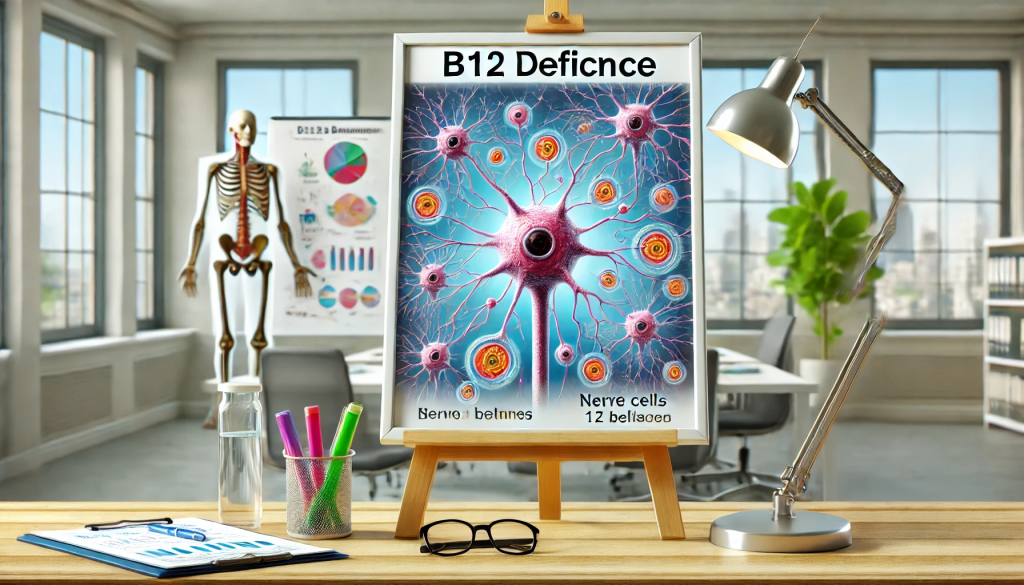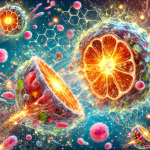Vitamin B12 deficiency is a condition that can occur due to insufficient dietary intake, malabsorption, or increased body needs. Vitamin B12 plays a crucial role in nervous system function, blood formation, and metabolism. Recognizing the symptoms of its deficiency is essential to prevent complications.
1. Weakness and Fatigue
- Chronic fatigue is one of the first signs of vitamin B12 deficiency.
- This is due to insufficient oxygen delivery to tissues caused by anemia.
2. Pale Skin
- Pale or yellowish skin indicates reduced red blood cell production.
- This condition is known as megaloblastic anemia.
3. Numbness and Tingling

- Vitamin B12 deficiency can cause nerve damage, leading to numbness and tingling in the hands and feet.
- These symptoms are related to impaired synthesis of myelin, a substance that covers nerves.
4. Cognitive Impairment
- Memory problems, difficulty concentrating, and confusion may result from B12 deficiency.
- In older adults, it can mimic symptoms of dementia.
5. Gastrointestinal Symptoms
- Loss of appetite, constipation, or diarrhea are also signs of deficiency.
- Weight loss may occur in some cases.
6. Enlarged Tongue
- A smooth, red, and enlarged tongue (glossitis) may be accompanied by pain and burning sensations.
- Mouth ulcers can also develop.
7. Anxiety and Depression

- Vitamin B12 is involved in serotonin synthesis, explaining the connection between its deficiency and anxiety and depression.
8. Heart Symptoms
- Rapid heartbeat and shortness of breath may result from low oxygen levels in the blood.
9. Lowered Immunity
- Frequent colds and infections can indicate a weakened immune system due to vitamin B12 deficiency.
10. Muscle Weakness
- A lack of B12 reduces energy levels, manifesting as muscle weakness.
Conclusion

Timely identification of vitamin B12 deficiency symptoms can prevent serious health consequences. Regular consumption of B12-rich foods (meat, fish, eggs, dairy products) or supplementation can help replenish its levels.
Vitamin B12 Deficiency: Understanding Its Importance
Vitamin B12, also known as cobalamin, is an essential water-soluble vitamin that plays a critical role in maintaining the body’s overall health. It is crucial for the production of red blood cells, DNA synthesis, and the proper functioning of the nervous system. A deficiency in this vital nutrient can lead to a range of health issues, from mild symptoms like fatigue to severe neurological and hematological complications. Despite its importance, Vitamin B12 deficiency is surprisingly common and often underdiagnosed.
One of the unique aspects of Vitamin B12 is its source. Unlike many other vitamins, B12 is not naturally produced by plants or animals. Instead, it is synthesized by certain bacteria and archaea, and humans primarily obtain it through animal-based foods like meat, fish, eggs, and dairy products. For this reason, vegetarians, vegans, and individuals with limited access to these foods are at a higher risk of developing a deficiency.
The absorption of Vitamin B12 is a complex process that begins in the stomach. Here, the vitamin binds to a protein called intrinsic factor, produced by specialized cells in the stomach lining. This complex is then absorbed in the ileum, the final part of the small intestine. Any disruption in this process—such as a lack of intrinsic factor, gastrointestinal surgeries, or conditions like Crohn’s disease—can impair B12 absorption and lead to deficiency.
Symptoms of Vitamin B12 deficiency can vary widely, making it a “great imitator” of other conditions. Early signs often include fatigue, weakness, pale or jaundiced skin, and difficulty concentrating. As the deficiency progresses, neurological symptoms may develop, including numbness or tingling in the hands and feet, balance problems, memory loss, and even mood disturbances like depression or irritability. In severe cases, long-term B12 deficiency can lead to irreversible nerve damage and cognitive decline.
In addition to neurological issues, B12 deficiency can cause hematological problems, most notably megaloblastic anemia. This condition occurs when the body produces abnormally large and immature red blood cells that cannot function properly. Symptoms of anemia include shortness of breath, dizziness, and a rapid heartbeat. Without adequate treatment, this condition can severely impact quality of life and overall health.
Certain populations are at a higher risk for Vitamin B12 deficiency. Older adults often face this issue due to reduced stomach acid production, which is necessary for the release of B12 from food. Individuals with gastrointestinal disorders like celiac disease or inflammatory bowel disease are also more susceptible. Additionally, people who have undergone bariatric surgery or other procedures affecting the stomach and intestines are at increased risk due to impaired absorption.
Vegans and vegetarians, as mentioned earlier, are particularly vulnerable since plant-based diets lack sufficient natural sources of Vitamin B12. Fortified foods and supplements are often necessary for these populations to meet their dietary needs. Pregnant and breastfeeding women who follow vegan diets should be especially cautious, as a deficiency can affect the neurological development of their infants.
Diagnosing Vitamin B12 deficiency typically involves blood tests to measure serum B12 levels, although this method may not always be reliable. Additional tests, such as measuring methylmalonic acid (MMA) and homocysteine levels, can provide a more accurate picture. Elevated levels of these substances often indicate a B12 deficiency, even when serum levels appear normal.
Treatment of Vitamin B12 deficiency depends on its severity and underlying cause. In mild cases, oral supplementation or dietary adjustments may suffice. For more severe deficiencies, especially those caused by absorption issues, intramuscular B12 injections are often required. These injections bypass the gastrointestinal tract, ensuring the vitamin reaches the bloodstream directly. In some cases, high-dose oral supplements may also be effective.
Prevention of Vitamin B12 deficiency involves a balanced diet rich in B12-containing foods. For those unable to consume enough through diet alone, supplements or fortified foods can help bridge the gap. Regular screening is also recommended for high-risk groups, such as older adults, vegetarians, and individuals with gastrointestinal disorders, to catch and address deficiencies early.
Vitamin B12 is vital not only for individual health but also for societal productivity, as its deficiency can lead to widespread fatigue and reduced cognitive performance. Public health initiatives emphasizing the importance of B12-rich diets, particularly in vulnerable populations, can play a significant role in reducing the burden of deficiency-related diseases.
In conclusion, Vitamin B12 is a cornerstone of human health, supporting critical functions like energy production, nerve health, and red blood cell formation. Its deficiency, while common, is preventable and treatable with timely intervention. Greater awareness of the symptoms, risk factors, and treatment options can help individuals maintain optimal health and avoid the potentially serious consequences of B12 deficiency.
















